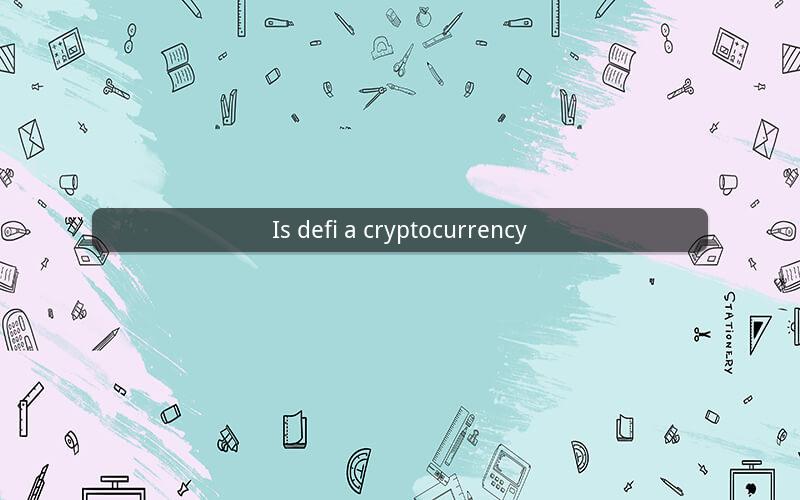
Is DeFi a Cryptocurrency?
Table of Contents
1. Introduction to DeFi
2. Understanding Cryptocurrencies
3. The Intersection of DeFi and Cryptocurrencies
4. Key Features of DeFi
5. DeFi Platforms and Protocols
6. The Role of Smart Contracts in DeFi
7. Risks and Challenges of DeFi
8. The Future of DeFi and Cryptocurrencies
9. Conclusion
1. Introduction to DeFi
Decentralized Finance (DeFi) is a rapidly evolving sector within the cryptocurrency ecosystem. It aims to replicate traditional financial services such as borrowing, lending, trading, and investing, but without the need for centralized intermediaries. DeFi leverages blockchain technology and smart contracts to create a more transparent, accessible, and efficient financial system.
2. Understanding Cryptocurrencies
Cryptocurrencies are digital or virtual currencies that use cryptography to secure transactions and control the creation of new units. They operate independently of a central authority, such as a government, and are typically decentralized. Bitcoin, the first and most well-known cryptocurrency, was created in 2009.
3. The Intersection of DeFi and Cryptocurrencies
DeFi and cryptocurrencies are closely intertwined. DeFi relies on cryptocurrencies as the underlying assets for its operations, while cryptocurrencies, in turn, benefit from the innovation and growth of DeFi platforms. This symbiotic relationship has led to a surge in the popularity and adoption of both DeFi and cryptocurrencies.
4. Key Features of DeFi
DeFi platforms offer several key features that differentiate them from traditional financial services:
- Decentralization: DeFi services are built on blockchain networks, eliminating the need for centralized authorities.
- Transparency: Transactions and smart contracts are visible to all participants, ensuring transparency and trust.
- Accessibility: DeFi services are accessible to anyone with an internet connection, regardless of location or financial status.
- Interoperability: DeFi platforms can interact with each other, allowing users to seamlessly move assets and services between different protocols.
- Security: Blockchain technology and smart contracts provide a high level of security, reducing the risk of fraud and theft.
5. DeFi Platforms and Protocols
Several DeFi platforms and protocols have emerged, each offering unique features and services:
- Uniswap: A decentralized exchange (DEX) that allows users to swap various cryptocurrencies without the need for a centralized order book.
- Aave: A decentralized lending and borrowing platform that enables users to earn interest on their deposits and borrow assets.
- Compound: A lending and borrowing platform that allows users to lend their assets and earn interest in return.
- SushiSwap: A fork of Uniswap that introduces a governance token, giving users a say in the platform's future.
6. The Role of Smart Contracts in DeFi
Smart contracts are self-executing contracts with the terms of the agreement directly written into code. They play a crucial role in DeFi by automating transactions and ensuring that they are executed as intended. Smart contracts eliminate the need for intermediaries, reduce costs, and increase efficiency.
7. Risks and Challenges of DeFi
Despite its many benefits, DeFi also comes with risks and challenges:
- Volatility: Cryptocurrencies are highly volatile, which can lead to significant price fluctuations and potential losses.
- Smart Contract Vulnerabilities: Smart contracts can contain bugs or vulnerabilities that hackers can exploit.
- Regulatory Uncertainty: The regulatory landscape for DeFi is still evolving, which can lead to legal and compliance issues.
- Liquidity Issues: Some DeFi platforms may face liquidity challenges, making it difficult to execute large transactions.
8. The Future of DeFi and Cryptocurrencies
The future of DeFi and cryptocurrencies looks promising. As the technology matures and regulatory frameworks become clearer, DeFi is expected to become more widespread and integrated into the traditional financial system. This could lead to increased adoption of cryptocurrencies and a more inclusive financial ecosystem.
9. Conclusion
DeFi is a transformative force in the cryptocurrency ecosystem, offering innovative solutions to traditional financial services. While it presents risks and challenges, the potential benefits of DeFi are significant. As the technology continues to evolve, DeFi and cryptocurrencies are poised to play a crucial role in the future of finance.
---
Questions and Answers
1. Question: What is the primary goal of DeFi?
- Answer: The primary goal of DeFi is to replicate traditional financial services in a decentralized and transparent manner.
2. Question: How does DeFi differ from traditional finance?
- Answer: DeFi differs from traditional finance by eliminating the need for centralized intermediaries, offering greater accessibility, and providing increased transparency and security.
3. Question: What is a smart contract?
- Answer: A smart contract is a self-executing contract with the terms of the agreement directly written into code.
4. Question: What are the main risks associated with DeFi?
- Answer: The main risks associated with DeFi include volatility, smart contract vulnerabilities, regulatory uncertainty, and liquidity issues.
5. Question: Can DeFi platforms be used for illegal activities?
- Answer: Yes, DeFi platforms can be used for illegal activities, just like any other technology or financial service.
6. Question: How does DeFi contribute to financial inclusion?
- Answer: DeFi contributes to financial inclusion by making financial services accessible to anyone with an internet connection, regardless of their location or financial status.
7. Question: What is the role of liquidity providers in DeFi?
- Answer: Liquidity providers in DeFi supply assets to decentralized exchanges and lending platforms, enabling users to trade and borrow without the need for centralized order books.
8. Question: How can users protect themselves from smart contract vulnerabilities?
- Answer: Users can protect themselves from smart contract vulnerabilities by thoroughly researching the code and protocols before interacting with them.
9. Question: What is the potential impact of DeFi on the traditional financial industry?
- Answer: The potential impact of DeFi on the traditional financial industry is significant, as it could lead to increased competition and innovation.
10. Question: How is DeFi expected to evolve in the future?
- Answer: DeFi is expected to evolve by becoming more secure, regulated, and integrated into the traditional financial system, leading to increased adoption and widespread use.